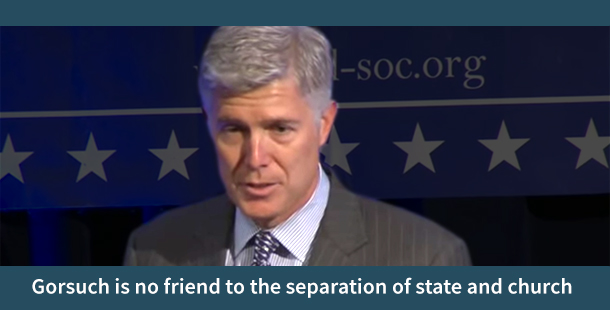
The Freedom From Religion Foundation is providing the Senate hard-hitting questions to ask Supreme Court nominee Neil Gorsuch.
The state/church watchdog group has submitted a number of queries to the Senate Judiciary Committee to pose to Gorsuch at his confirmation hearing on Monday, March 20.
Most of FFRF’s questions relate to Gorsuch’s views on the Establishment Clause of the First Amendment to the U.S. Constitution, which President Thomas Jefferson described as erecting “a wall of separation between church and state.”
But given Gorsuch’s background and 2006 book, “The Future of Assisted Suicide and Euthanasia,” FFRF’s most pointed inquiries are directed at Gorsuch’s statements about “the inviolability of life.”
Questions FFRF would like to pose include whether:
• Gorsuch draws “any distinction between ‘assisted suicide,’ in which the patient requests help dying, and homicide?”
• Gorsuch considers “the right to privacy extends to the medical decisions of a pregnant woman and her doctor?”
• Gorsuch supports federal and state death penalties?
Gorsuch notably concurred as a justice on the 10th U.S. Circuit Court of Appeals in a ruling in favor of Hobby Lobby’s claim that as a for-profit corporation, its religious rights were violated due to women employees selecting forms of contraception the founder disapproved of. Hobby Lobby ultimately prevailed at the U.S. Supreme Court, when the high court notoriously ruled Hobby Lobby had a right to be exempted on religious grounds from complying with the contraceptive mandate in the Affordable Care Act.
In that concurrence, Gorsuch wrote: “All of us face the problem of complicity. All of us must answer for ourselves whether and to what degree we are willing to be involved in the wrongdoing of others.”
FFRF would like Gorsuch to respond to two questions related to that statement:
• “Is there no limit to what actions an individual or a corporation can refuse to take in the name of their religious beliefs?”
• “Do you truly believe that a female employee who uses common forms of contraception can be characterized as engaging in ‘wrongdoing’?”
Under the increasingly hostile judicial attitudes toward standing doctrine, FFRF seeks to ask Gorsuch how he’ll ensure that laws meant to protect society are actually enforceable?
FFRF also wonders why we need laws like the Religious Freedom Restoration Act, given the protections under the First Amendment’s Establishment Clause and Free Exercise Clause. The act was the basis of the Hobby Lobby ruling. State versions are spawning great discord as legislators seek to exempt places of public accommodation from serving or working with citizens based on religious objections, such as objections to those who are LGBT.
But FFRF says it believes the most important question for Gorsuch to answer is: “As a justice of the Supreme Court, will you commit to upholding the letter of the law even if doing so conflicts with your personal religious beliefs?”
The questions are a follow-up to FFRF’s preliminary statement about Gorsuch indicating it is “highly apprehensive” about his views on the First Amendment and the right to privacy. Currently, five of the justices on the Supreme Court are Roman Catholic — four of them ultraconservative.
In its original statement FFRF noted Gorsuch would be the lone Episcopalian if appointed, thereby perhaps giving a little diversity to the court. (The other two justices are Jewish; currently none is Protestant or openly nonreligious; the late Justice Antonin Scalia, whom Gorsuch is nominated to replace, was Roman Catholic.) FFRF notes, in fact, that Gorsuch’s background is Roman Catholic. Gorsuch converted to Episcopalianism as an adult, but was raised Roman Catholic and attended Roman Catholic school for a number of years. His Catholic mother, Anne Gorsuch, has been described as “fervently antiabortion” by The New York Times.
For more background, read FFRF Co-President Dan Barker’s blog “Beware of Gorsuch’s disturbing views on abortion and death with dignity,” a detailed analysis on Gorsuch’s views on assisted suicide.
The Freedom From Religion Foundation is a nonprofit organization representing more than 27,000 members across the nation, including members in every state. Its purposes are to protect the constitutional principle of separation between religion and government, and to educate the public about nontheism.

